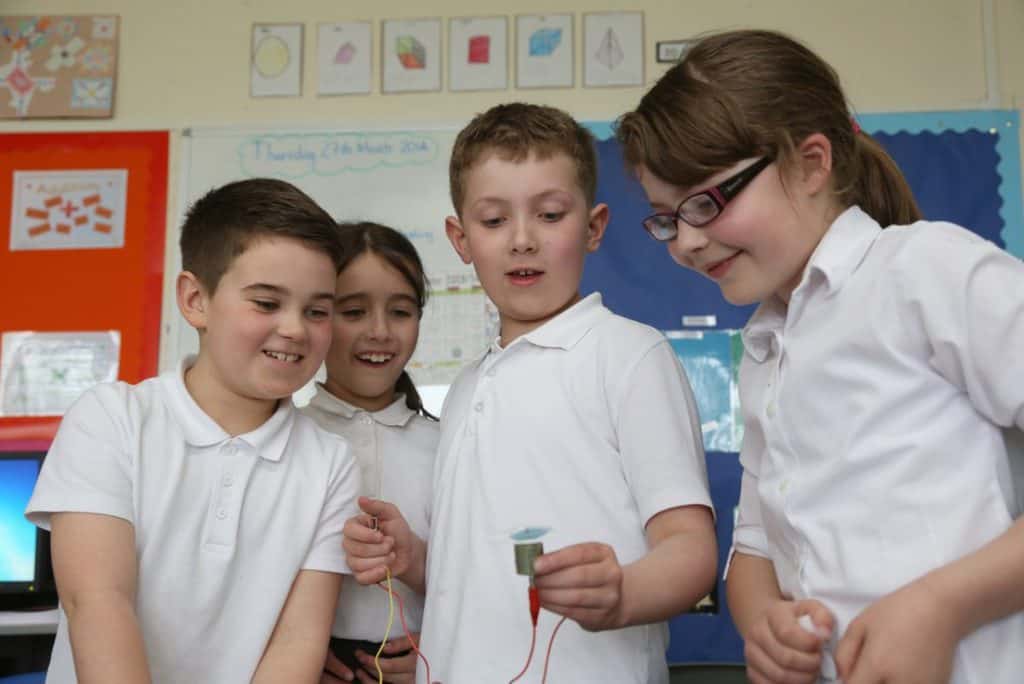More than 70% of primary practitioners are more confident teaching STEM subjects through their involvement with the Raising Aspirations in Science Education (RAiSE) programme.
An external evaluation of the programme, which has been active in Dumfries & Galloway, also found that 87% of pupils enjoyed more challenge in their STEM learning and 77% had increased aspirations in terms of STEM careers.
Now RAiSE, which has been in 12 authorities during the pilot period, will be made available, on a rolling basis, to other regions in Scotland to improve primary teachers’ confidence and skills to deliver high-quality, motivating and engaging STEM lessons to pupils.
Karen Creighton, RAiSE Primary Science Development Officer (PSDO) in Dumfries & Galloway, said:
“It has been a pleasure empowering teachers in Dumfries & Galloway to better understand what they can achieve in their classrooms and across their school communities through STEM education. Creating local opportunities and networks, as well as identifying enthusiastic teachers has been vitally important. It’s great that this evaluation has proven these efforts to be a success.”
RAiSE, which is delivered through a partnership of Education Scotland, The Wood Foundation, Scottish Government and participating local authorities, deploys PSDOs to devise and deliver professional learning, foster key community and industry relationships and create sustainable STEM networks.
Minister for Further Education, Higher Education and Science, Mr Richard Lochhead MSP said:
“I am pleased to see the positive results from evaluation of the RAiSE pilot, particularly in raising teacher confidence in delivering STEM in the school curriculum.
“The objectives of the programme are clearly aligned to the Government’s STEM Education and Training Strategy, and complement other activity taking place to drive forward improvements in STEM education and training in Scotland and the wide range of fantastic activity that is taking place in our schools and wider communities.
“It is clear that the programme has brought benefits to those in the initial eight local authorities that participated. I am sure that these benefits will also be seen in the four authorities who joined the programme this year, and I look forward to more authorities taking advantage of the flexibility of the programme to suit their local needs.”
Gayle Gorman, Chief Executive of Education Scotland, added:
“This is an exceptional example of how working collaboratively with local authorities can deliver real outcomes for our schools – most notably in boosting the confidence of teachers in delivering STEM education to our children.
“Supporting our teachers is vital to delivering the RAiSE programme and it is encouraging to see their increased confidence and skills having a flow on effect to improving pupil engagement with STEM.
“The evidence shows us that pupils are really taking the messages of the programme onboard, with children telling us that they think that STEM should be taught in primary schools and that anyone can have a job in STEM-related careers.”
The external evaluation by the Robert Owen Centre at the University of Glasgow found that the flexibility of the RAiSE model had increased teacher confidence and pupil engagement in STEM in a sustainable, collaborative and systemic way.
This was achieved through the ability of local PSDOs to tailor the programme to meet the needs and priorities of their regions while addressing core objectives and national educational drivers.
Ali MacLachlan, UK Director of The Wood Foundation, said:
“We are incredibly proud of the work being undertaken by the RAiSE team throughout Scotland and delighted that the evaluation confirms this model is an efficient, effective and impactful way to sustainably address the needs of primary teachers and pupils in relation to high-quality STEM education.
“Motivating and engaging young people in STEM is vital for their continued education and developing their skills to prepare them for the world of work.
“Upskilling teachers and increasing their confidence is vital if they are to influence, inspire and educate pupils with the skills needed for today and the future.
“Now the evaluation has proven the pilot to be a success, we are delighted to be able to offer this opportunity to all local authorities in Scotland.”
The programme has delivered more than 600 professional opportunities resulting in 6500 engagements with teachers.
Many of the training events focus on creating STEM leaders who can cascade learning within their own establishments and clusters underpinning the sustainability key to the programme.





